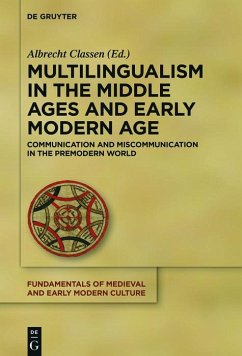
Libraries in the Manuscript Age (eBook, ePUB)

PAYBACK Punkte
0 °P sammeln!
The case studies presented in this volume help illuminate the rationale for the founding of libraries in an age when books were handwritten, thus contributing to the comparative history of libraries. They focus on examples ranging from the seventh to the seventeenth century emanating from the Muslim World, East Asia, Byzantium and Western Europe. Accumulation and preservation are the key motivations for the development of libraries. Rulers, scholars and men of religion were clearly dedicated to collecting books and sought to protect these fragile objects against the various hazards that threat...
The case studies presented in this volume help illuminate the rationale for the founding of libraries in an age when books were handwritten, thus contributing to the comparative history of libraries. They focus on examples ranging from the seventh to the seventeenth century emanating from the Muslim World, East Asia, Byzantium and Western Europe. Accumulation and preservation are the key motivations for the development of libraries. Rulers, scholars and men of religion were clearly dedicated to collecting books and sought to protect these fragile objects against the various hazards that threatened their survival. Many of these treasured books are long gone, but there remain hosts of evidence enabling one to reconstruct the collections to which they belonged, found in ancient buildings, literary accounts, archival documentation and, most crucially, catalogues. With such material at hand or, in some cases, the manuscripts of a certain library which have come down to us, it is possible to reflect on the nature of these libraries of the past, the interests of their owners, and their role in the intellectual history of the manuscript age.
Dieser Download kann aus rechtlichen Gründen nur mit Rechnungsadresse in A, B, BG, CY, CZ, D, DK, EW, E, FIN, F, GR, HR, H, IRL, I, LT, L, LR, M, NL, PL, P, R, S, SLO, SK ausgeliefert werden.













